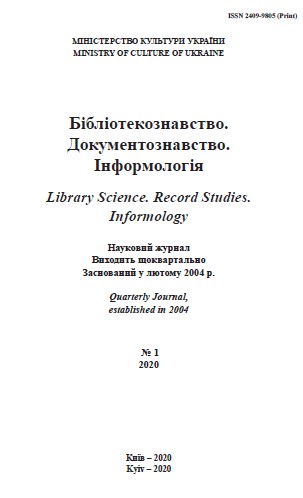РЕДАКТОР НАУКОВОГО ЖУРНАЛУ ЯК ГЕЙТКІПЕР НАУКИ, ОРГАНІЗАТОР ВИДАВНИЧОГО ПРОЦЕСУ, КОНСУЛЬТАНТ ТА РЕКРУТЕР
EDITOR OF SCIENTIFIC JOURNAL AS A GATEKEEPER OF SCIENCE, ORGANIZER OF PUBLISHING PROCESS, CONSULTANT AND RECRUITER
Author(s): Svitlana Borisivna FiialkaSubject(s): Theory of Literature, Source Material
Published by: Національна академія керівних кадрів культури і мистецтв
Keywords: scientific journal; editor; gatekeeper; organizer; consultant; recruiter; peer review; conflict of interest;
Summary/Abstract: The purpose of the article. On the basis of current scientific achievements, the role of the editor of the scientific journal is considered. Methodology. The article is a narrative review of the literature. The methods of analysis, classification, and generalization, as well as a systematic approach, were used in the review. The methodology used made it possible to comprehensively analyze the roles of the editor of a scientific journal. The scientific novelty is to broaden the perception of the editor’s role in the editorial and publishing process. Conclusions. The editor of the scientific journal acts as the gatekeeper of science, organizer, consultant, and recruiter. In the role of gatekeeper, the editor filters the results of scientific research, selecting the ones that will be published. As the organizer, the editor is responsible for the interaction of all participants of the editorial and publishing process and the strategy for the development of the journal, initiates the journal’s entry into scientific-metric databases, and establishes external links of the journal. As a consultant, the editor helps the authors improve the quality of the manuscripts, and in the role of recruiter he or she forms the editorial board, appoints reviewers, invites new authors to collaborate. In general, the editor’s roles are reduced to supporting the interests and interaction of four stakeholders: the founder of the journal, the author, reviewers, and the reader. The identity of the editor is invisible when the editorial and publishing system works smoothly. However, in problematic situations, for example, when an unreasonable decision is made regarding the manuscript when the reviewer receives an inappropriate manuscript for examination when there are not enough articles to fill the volume when conflicts and misunderstandings arise between the participants of the editorial and publishing process, the editor has to balance the needs, opportunities, and requirements of all stakeholders. In addition, the editor is responsible for adhering to the principles of academic integrity.
Journal: Бібліотекознавство. Документознавство. Інформологія
- Issue Year: 2020
- Issue No: 4
- Page Range: 63-70
- Page Count: 8
- Language: Ukrainian

